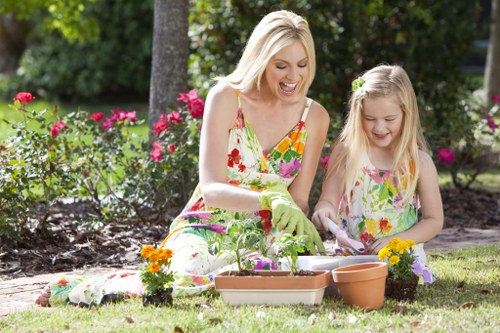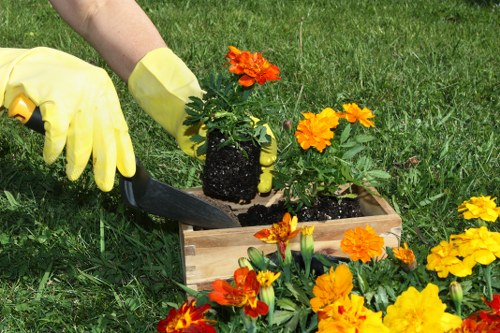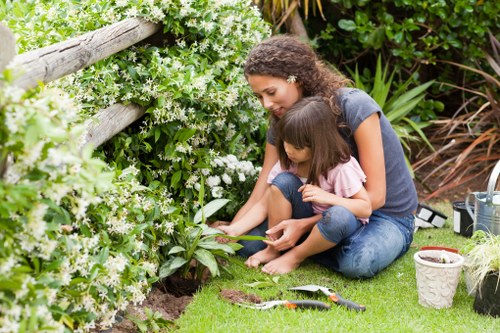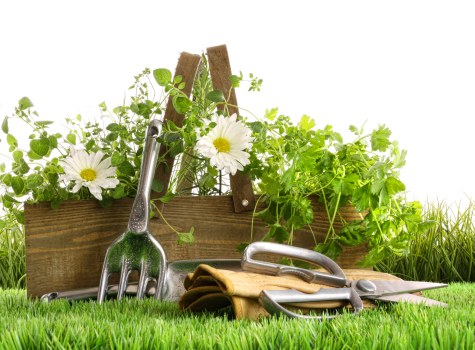Transform Your Outdoor Space: Expert Landscaping in Tooting
Why Choose Landscaping Services in Tooting?

Landscaping in Tooting offers a unique blend of aesthetic appeal and functional design, enhancing the beauty and value of your property. Whether you’re looking to create a serene garden oasis or a vibrant outdoor entertainment area, professional landscaping services can bring your vision to life.
With the ever-growing demand for well-designed outdoor spaces, Tooting’s landscape experts are equipped with the knowledge and skills to transform any area into a stunning environment. From selecting the right plants to implementing sustainable practices, landscaping in Tooting ensures your outdoor space is both beautiful and eco-friendly.
Investing in landscaping not only improves the curb appeal of your home but also provides a peaceful retreat where you can relax and enjoy nature. The tailored services offered by local landscapers cater to the specific needs of Tooting residents, ensuring personalized and effective solutions.
Comprehensive Landscaping Services Offered

Tooting landscaping services encompass a wide range of offerings designed to meet diverse needs. From initial design consultations to ongoing maintenance, professionals ensure that every aspect of your outdoor space is meticulously planned and executed.
Design and Planning: Expert landscapers work closely with clients to understand their preferences and requirements. Through detailed planning, they create designs that complement the existing architecture and natural surroundings of your property.
Installation and Construction: Once the design is finalized, skilled professionals handle the installation of plants, trees, irrigation systems, and hardscape elements such as patios and pathways. Their expertise ensures that each component is seamlessly integrated into the overall landscape.
Choosing the Right Plants for Your Tooting Garden

Selecting appropriate plants is crucial for creating a thriving garden in Tooting’s climate. Local landscapers have in-depth knowledge of which species thrive in the area, ensuring that your garden remains vibrant and healthy throughout the year.
Consider incorporating a mix of native plants and seasonal flowers to add color and texture to your outdoor space. Additionally, choosing drought-resistant species can contribute to sustainable landscaping practices, reducing water usage and maintenance efforts.
Advantages of Native Plants: Native plants are well-adapted to the local climate and soil conditions, making them easier to maintain and more resilient against pests and diseases. They also support local wildlife, contributing to a balanced ecosystem.
Hardscaping Elements to Enhance Your Outdoor Space

Integrating hardscaping elements like patios, walkways, and retaining walls can significantly enhance the functionality and aesthetics of your garden. These structures provide defined spaces for relaxation and entertainment, adding structure and visual interest to your landscape.
Patios offer a perfect spot for outdoor dining and gatherings, while walkways guide visitors through your garden, highlighting key features and creating a sense of flow. Retaining walls not only add height and dimension but also help manage soil erosion and drainage.
Materials Matter: Choosing the right materials for hardscaping is essential for durability and style. Popular options include natural stone, brick, and concrete, each offering unique textures and colors to complement your garden design.
Maintenance Tips for a Lush and Healthy Garden

Proper maintenance is key to ensuring that your landscaped garden remains lush and vibrant. Regular care routines help prevent issues such as plant diseases, pest infestations, and weed growth, ensuring that your outdoor space stays beautiful year-round.
Irrigation and Water Management: Implementing an efficient irrigation system ensures that your plants receive adequate water without wastage. Drip irrigation and rainwater harvesting are sustainable practices that contribute to water conservation.
Pruning and Trimming: Regular pruning of trees and shrubs promotes healthy growth and maintains the desired shape and size of your plants. It also enhances the overall appearance of your garden.
Benefits of Professional Landscaping Services
Hiring professional landscapers in Tooting offers numerous benefits, from saving time and effort to ensuring high-quality results. Professionals bring expertise and experience, allowing them to create and maintain landscapes that meet your specific needs and preferences.
Moreover, professional landscapers stay updated with the latest trends and techniques in the industry, ensuring that your garden remains modern and stylish. Their ability to troubleshoot issues and implement effective solutions ensures that your outdoor space is always in top condition.
Enhanced Property Value: A well-designed and maintained landscape significantly boosts the value of your property, making it more attractive to potential buyers if you decide to sell in the future.
Incorporating Sustainable Practices in Landscaping
Sustainability is becoming increasingly important in landscaping, and Tooting’s landscapers are at the forefront of implementing eco-friendly practices. From using native plants to reducing water usage, sustainable landscaping contributes to environmental conservation while maintaining beauty.
Challenging the traditional norms, many professionals are adopting green technologies such as solar-powered lighting and permeable paving materials, which help reduce the ecological footprint of your garden.
Composting and Mulching: These practices improve soil health, retain moisture, and reduce the need for chemical fertilizers, creating a more sustainable and healthy garden environment.
Seasonal Landscaping Tips for Tooting Gardens
Different seasons bring unique challenges and opportunities for your garden. Adapting your landscaping practices to the changing seasons ensures that your outdoor space remains vibrant and healthy throughout the year.
Spring: Focus on planting new flowers and shrubs, pruning dead branches, and preparing your garden beds for the growing season.
Summer: Maintain your irrigation systems, manage weed growth, and ensure your plants receive adequate water and shade to thrive during the hotter months.
Choosing the Right Landscaping Company in Tooting
Selecting a reputable landscaping company is essential for achieving the best results. Look for companies with a strong portfolio, positive reviews, and a clear understanding of your vision and requirements.
Engage with local landscapers who are familiar with the Tooting climate and soil conditions, ensuring that they can provide tailored solutions that suit your specific needs.
Questions to Ask:
- What is your experience with projects similar to mine?
- Can you provide references or examples of your previous work?
- What sustainable practices do you incorporate in your landscaping services?
Innovative Landscaping Trends in Tooting
Staying updated with the latest landscaping trends can breathe new life into your garden. Tooting landscapers are embracing innovative designs and technologies to create contemporary and sustainable outdoor spaces.
Vertical Gardens: Maximizing space through vertical gardening allows for lush greenery even in smaller gardens, adding a modern touch to your outdoor area.
Smart Irrigation Systems: Utilizing technology to manage water usage efficiently ensures that your garden remains hydrated while conserving resources.
Creating Outdoor Living Spaces
The concept of outdoor living spaces has gained popularity, allowing homeowners to extend their living areas into the garden. By incorporating elements such as outdoor kitchens, seating areas, and fire pits, you can create a versatile and inviting environment for relaxation and entertainment.
Lighting: Strategic lighting enhances the ambiance of your outdoor space, making it usable during the evening and highlighting key landscape features.
Furniture and Decor: Comfortable and stylish outdoor furniture, along with decorative elements, adds personality and functionality to your garden.
Maintaining Your Landscape Year-Round
Consistent maintenance is essential for keeping your landscape in pristine condition throughout the year. Regular tasks such as mowing, fertilizing, and pest control ensure that your garden remains healthy and attractive.
Employing a maintenance schedule helps manage these tasks efficiently, preventing potential issues and reducing the need for extensive repairs or renovations in the future.
Professional Maintenance Services: Many landscaping companies offer comprehensive maintenance packages, providing ongoing support to keep your garden looking its best with minimal effort on your part.
Cost Factors in Landscaping Projects
Understanding the cost factors involved in landscaping is crucial for budgeting and planning your project. Expenses can vary based on the size of the area, the complexity of the design, and the materials used.
Design and Labor: Professional design services and skilled labor contribute significantly to the overall cost, ensuring high-quality results that meet your expectations.
Materials and Plants: The choice of plants, hardscape materials, and additional features like lighting and irrigation systems can impact the total investment required for your landscaping project.
Maximizing Curb Appeal with Landscaping
A well-designed landscape can dramatically enhance the curb appeal of your property, making a lasting impression on visitors and potential buyers. Thoughtful design elements, such as entryway lighting, colorful flower beds, and tidy hedges, contribute to an inviting exterior.
Symmetry and Balance: Creating a balanced and symmetrical layout ensures that your garden appears organized and aesthetically pleasing from the street view.
Statement Plants: Incorporating focal points like large trees or unique plant varieties can draw attention and add character to your landscape design.
Enhancing Privacy with Strategic Landscaping
Creating a private outdoor space allows you to enjoy your garden without disturbances. Strategic placement of trees, shrubs, and fencing can provide the necessary seclusion, making your garden a personal sanctuary.
Screening Plants: Tall hedges and dense plants act as natural barriers, blocking unwanted views and creating a sense of enclosure.
Privacy Fencing: In addition to natural elements, adding fencing or walls enhances privacy while offering structural support for your landscape design.
Integrating Water Features into Your Garden
Water features such as fountains, ponds, and waterfalls add a soothing element to your garden, creating a tranquil atmosphere. The sound of flowing water enhances the sensory experience, making your outdoor space more enjoyable.
Types of Water Features: From simple birdbaths to elaborate pond systems, the variety of water features available allows you to choose one that best fits your garden size and design preferences.
Maintenance Considerations: Regular upkeep of water features is necessary to ensure clean and clear water, preventing issues like algae growth and mosquito breeding.
Lighting Solutions for Outdoor Spaces
Proper lighting is essential for showcasing your landscape’s beauty during the evening hours. Well-placed lights highlight key features, improve safety, and extend the usability of your outdoor space after dark.
Types of Outdoor Lighting: Options include pathway lights, spotlights, and ambient lighting, each serving a specific purpose in enhancing your garden’s appeal.
Energy-Efficient Options: LED lighting and solar-powered fixtures offer sustainable solutions that reduce energy consumption while providing adequate illumination.
The Importance of Soil Health in Landscaping
Healthy soil is the foundation of a thriving garden. Proper soil management practices ensure that your plants receive the necessary nutrients and have a stable environment for growth.
Soil Testing: Conducting regular soil tests helps identify nutrient deficiencies and pH imbalances, allowing for timely adjustments and improvements.
Amending the Soil: Adding organic matter, such as compost, enhances soil structure, improves drainage, and increases fertility, promoting robust plant growth.
Creating Sustainable Gardens in Tooting
Sustainability in landscaping involves practices that protect the environment and promote resource conservation. By incorporating green principles, you can create a garden that is both beautiful and eco-friendly.
Rain Gardens: These gardens capture and utilize rainwater runoff, reducing flooding and promoting groundwater recharge. They also provide habitats for pollinators and other beneficial wildlife.
Permeable Paving: Using permeable materials for pathways and driveways allows water to seep into the ground, minimizing runoff and supporting soil health.
Seasonal Flowering Plants for Tooting Gardens
Incorporating seasonal flowering plants ensures a vibrant and colorful garden throughout the year. Each season offers unique blooms that can be strategically planted to provide continuous interest and beauty.
Spring Blooms: Tulips, daffodils, and crocuses are excellent choices for bringing early color to your garden.
Summer Flowers: Roses, lavender, and sunflowers thrive in the warmer months, adding rich hues and pleasant fragrances.
Functional Landscaping for Small Gardens
Even with limited space, effective landscaping can create a functional and aesthetically pleasing garden. By maximizing vertical space and choosing compact plant varieties, you can achieve a lush garden without sacrificing space.
Vertical Gardens: Utilizing trellises, wall-mounted planters, and vertical structures allows you to grow plants upward, saving ground space while adding greenery.
Compact Plant Varieties: Selecting dwarf shrubs, miniature roses, and other small-scale plants ensures that your garden remains manageable and visually appealing.
Incorporating Edible Plants into Your Landscape
Integrating edible plants into your garden not only enhances its beauty but also provides fresh produce for your kitchen. Herbs, vegetables, and fruit-bearing plants can be seamlessly incorporated into your landscape design.
Herb Gardens: Grow a variety of herbs such as basil, thyme, and rosemary, ensuring easy access for culinary use and adding aromatic value to your garden.
Vegetable Beds: Raised beds and container gardening are effective ways to cultivate vegetables, maximizing yield while maintaining organization and accessibility.
Enhancing Garden Privacy with Pergolas and Arbors
Pergolas and arbors are excellent additions to your garden, providing both structural beauty and functional privacy. These features create designated areas for relaxation and can support climbing plants, adding vertical interest to your landscape.
Design Options: Choose from various styles and materials, such as wood, metal, or vinyl, to complement your garden’s aesthetic and architectural elements.
Climbing Plants: Incorporating climbing roses, ivy, or grapevines enhances the natural beauty of pergolas and arbors, creating shaded areas and enhancing privacy.
Integrating Art and Sculpture into Your Garden
Artistic elements and sculptures can add a unique and personal touch to your garden, serving as focal points and conversation starters. These features reflect your personality and enhance the overall ambiance of your outdoor space.
Choosing the Right Pieces: Select sculptures and art pieces that complement your garden’s theme and scale, ensuring they blend seamlessly with the natural surroundings.
Placement: Strategically position art elements to highlight specific areas of your garden, such as near water features or along pathways, creating visual interest and balance.
Creating a Sustainable Garden with Native Plants
Utilizing native plants in your landscaping promotes sustainability and supports local biodiversity. These plants are well-adapted to the regional climate and soil, requiring less water and maintenance while providing habitat for native wildlife.
Benefits of Native Plants: They are more resistant to local pests and diseases, reducing the need for chemical treatments and promoting a healthier garden ecosystem.
Pollinator-Friendly Plants: Incorporate flowers and shrubs that attract bees, butterflies, and other pollinators, contributing to the health of local ecosystems and enhancing garden productivity.
Maximizing Light and Shade in Your Landscape Design
Balancing light and shade is essential for creating a comfortable and inviting garden. Strategic placement of trees, shrubs, and structures can regulate sunlight exposure, ensuring that plants thrive and outdoor spaces are comfortable.
Shade Trees: Planting deciduous trees provides shade during the summer while allowing sunlight to penetrate during the winter months when the leaves fall, maintaining natural light cycles.
Shade Structures: Pergolas, gazebos, and pergolas offer additional shaded areas, creating designated spots for relaxation and gatherings regardless of the weather.
Incorporating Sustainable Irrigation Systems
Efficient irrigation systems are vital for maintaining a healthy garden while conserving water resources. Sustainable irrigation practices ensure that your plants receive adequate hydration without unnecessary wastage.
Drip Irrigation: This method delivers water directly to the plant roots, minimizing evaporation and runoff, and providing precise hydration for each plant.
Rainwater Harvesting: Collecting and utilizing rainwater reduces dependence on municipal water supplies, promoting environmental conservation and cost savings.
Enhancing Safety with Landscaping
Proper landscaping can significantly enhance the safety of your property by addressing visibility, accessibility, and environmental hazards. Thoughtful design and maintenance prevent accidents and create a secure outdoor environment.
Pathway Lighting: Well-lit pathways reduce the risk of trips and falls, ensuring safe navigation around your garden during nighttime hours.
Clear Sightlines: Maintaining clear lines of sight by trimming overgrown vegetation and strategically placing structures improves security and visibility.
Using Mulch to Improve Garden Health
Mulching is an effective practice for enhancing garden health and appearance. It involves covering the soil surface with organic or inorganic materials to provide various benefits.
Benefits of Mulch: Mulch helps retain soil moisture, suppresses weed growth, and regulates soil temperature, creating a favorable environment for plant roots.
Types of Mulch: Options include bark, straw, compost, and gravel, each offering unique advantages and aesthetic qualities to suit different garden styles.
Creating Accessible Gardens for All
Accessible gardening ensures that everyone, including individuals with disabilities or limited mobility, can enjoy and maintain a beautiful outdoor space. Thoughtful design and features make your garden inclusive and user-friendly.
Accessibility Features: Incorporate wide pathways, smooth surfaces, and raised beds to facilitate easy movement and access to plants and garden areas.
Adaptive Tools: Utilize ergonomic gardening tools and assistive devices that make gardening tasks more manageable, promoting independence and enjoyment for all.
Final Thoughts on Landscaping in Tooting
Landscaping in Tooting offers endless possibilities for transforming your outdoor space into a personalized haven. By leveraging the expertise of local professionals, you can create a landscape that not only enhances the beauty and functionality of your property but also contributes to environmental sustainability.
Whether you’re starting from scratch or looking to revitalize your existing garden, Tooting’s landscaping services provide comprehensive solutions tailored to your unique vision and needs.
Ready to transform your garden? Contact us today to explore how our expert landscaping services in Tooting can bring your outdoor dreams to life.

